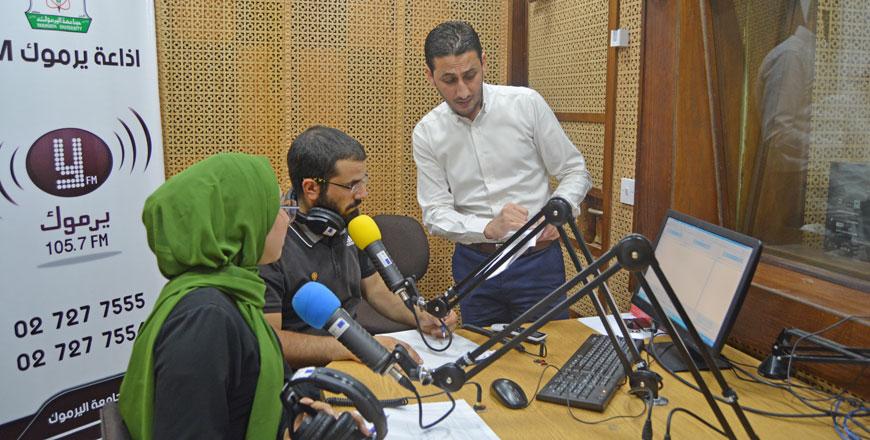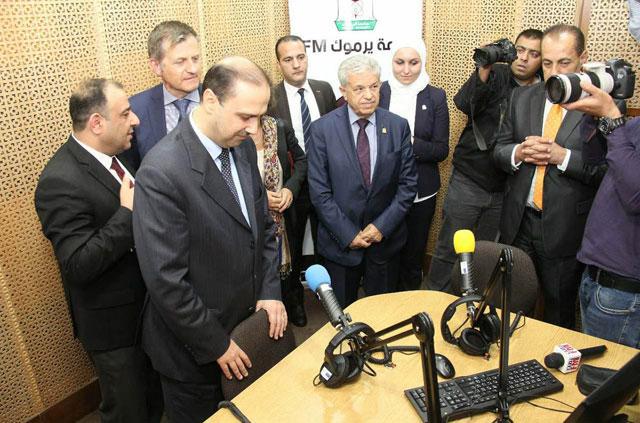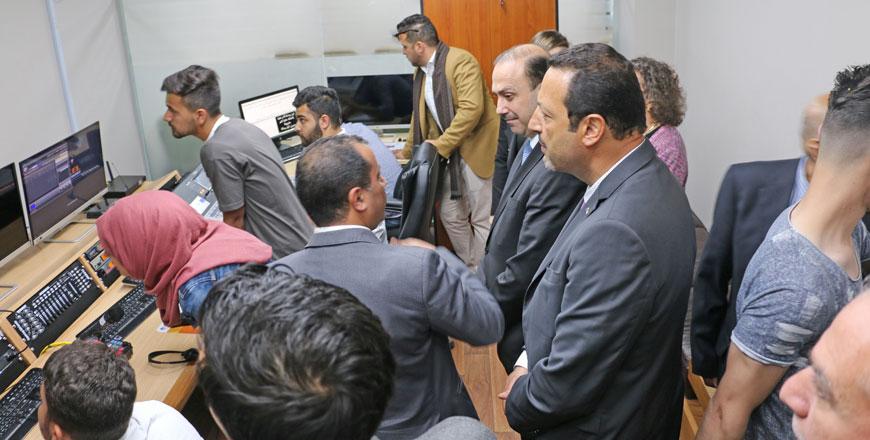You are here
Irbid’s Yarmouk FM comes back to life with EU, UNESCO media support
By Camille Dupire - Jun 07,2018 - Last updated at Jun 07,2018

Azzam Al Azzam briefs the radio staff at Yarmouk FM studio in Irbid recently (Photo courtesy of Azzam al Azzam)
AMMAN — A Masters' graduate in media studies, Azzam Al Azzam has always been passionate about radio, an affection he has shown through eight years of dedicated services at Yarmouk FM.
Currently working as a radio programme manager, Al Azzam, 35, said the recent support provided by the EU funded and UNESCO implemented “Support to Media in Jordan” (STMJ) project has "changed".
“Before we received the new media equipment, it was a choice of life or death for Yarmouk FM. The old equipment was obsolete and I see the equipment donation as the most important aspect of the EU support,” Azzam recently told The Jordan Times.
The programme manager started his morning like many other days: he just finished meeting with a team of radio station volunteers, brainstorming programme ideas for upcoming shows.
Yarmouk FM, which runs as a collaborative and not for profit organisation, relies heavily on student volunteers, with an estimated 50-60 students working at the local radio. Although the students do not receive university credits for their work, they are all deeply dedicated to producing quality programming.
“When I started, I was preparing local news and editing. Now, I produce and present programmes, especially the breakfast programme ‘Hawa Hauran’ which is very popular,” recalled 21-year-old Aoun Al Hadded, who has been working at Yarmouk FM for three years.
“I have learned so much about radio over the past few years and I really enjoy passing on my knowledge and sharing my experiences with new volunteers at the station. In the future, I want to be a reporter that focuses either on football or covers news coming out of Jerusalem,” the young student said, expressing his hope to continue volunteering role even after his graduation from Yarmouk University this summer.
From editors to technicians and reporters or communications people, the volunteers discuss programming ideas with guidance from Azzam, and, approximately ten days later, the programmes go on air.
“As we are not influenced by the private sector or other forces, we enjoy freedom in our broadcasting and really feel we are doing something for the local people we are proud to call our listeners,” the programme manager explained, voicing his appreciation for the recent EU support.
As part of a 1.5 million euro donation to develop local radios and universities around Jordan, the STMJ project helped provide high-tech equipment required to refurbish Yarmouk FM and the faculty of mass communications at Yarmouk University. The EU donation included 120 desktop computers in the multimedia computer labs, a new mixer, a professional tuner, a professional CD/MP3 player, headphones, microphones, studio desks and workstations for the faculty, while the TV studio received three new studio cameras, a professional prompter, a studio monitor, microphones and audio monitors.
The radio station has also moved to a brand new location, aiming to improve their delivery of high quality media content and training of the next generation of media leaders.
Commenting on the donation, EU Ambassador to Jordan Andrea Matteo Fontana, said “As part of our broader efforts to support the media sector in Jordan, we want to support community radios. Secondly, we want to reach out to students so they can have better opportunities to become professionals and thirdly, we believe that this is going to help young people to find jobs in the private sector.”
Since 2014, the STMJ project has worked to support Jordan’s efforts in advancing Jordanian media to further increase its freedom, independence and professionalism, according to a UNESCO statement, which stressed that, "besides its generous funding of the project, the EU has been a strong partner of UNESCO in strengthening an enabling regulatory and institutional environment, and enhancing the capacity for an independent, quality based media sector in Jordan serving the entire population”.
Part of these efforts includes the technical support provided to the team of Yarmouk FM to bolster their connection with listeners and the local community. They managed to set up a “listener’s club”, which is composed of members interested in providing constructive feedback to the local radio FM.
"Participants listen to the programming as it airs and then contribute constructive evaluation of the themes and material, with the overall aim of supporting the delivery of quality, connected programming," a UNESCO official said, noting that the club also works to provide an element of "citizen journalism", with members contacting the station with ideas or when something newsworthy is taking place within the community.
Al Azzam said he is “proud" that approximately 80-90 per cent of the programming on Yarmouk FM is broadcast live, therefore encouraging interaction with the audience.
Related Articles
AMMAN — Students from Yarmouk’s faculty of mass communication and Yarmouk FM on Sunday welcomed the delivery of brand new media equipment fr
AMMAN — The efforts of local community radio station Farah Al Nas in tackling political, social and developmental issues related to youth an
AMMAN — The European Union and UNESCO Amman office on Monday celebrated the provision of new radio and studio equipment to the Middle East U


















